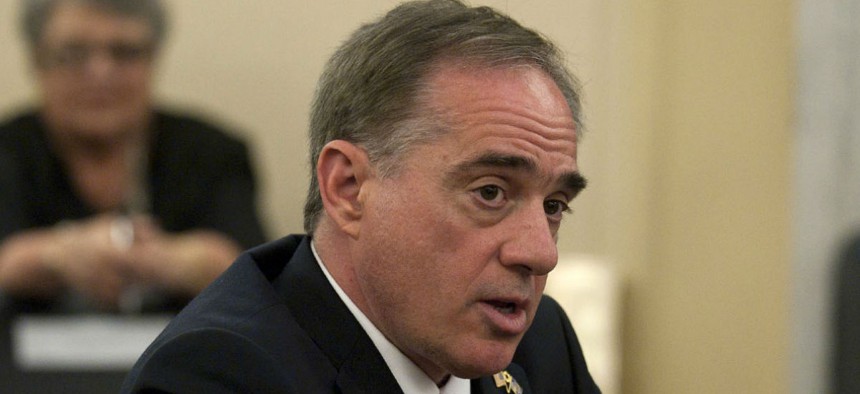
VA Secretary David Shulkin would like to re-fire the official. Robert Turtil/ VA file photo
VA Secretary Vows to Re-Fire Former D.C. Health Center Chief
Review board last week issued a temporary stay on ex-employee’s firing last week.
Veterans Affairs Secretary David Shulkin on Wednesday blasted a decision by Merit Systems Protection Board Vice Chairman Mark Robbins to issue a stay in the firing of the former director of the VA medical facility in Washington, D.C.
Brian Hawkins was relieved of his duties at the D.C. medical center in April after a report faulted the center for deficiencies in how it handles medical supplies. He worked in an administrative role at the agency’s headquarters until June 9, when officials proposed that he be fired.
The Office of Special Counsel, which investigates allegations of prohibited personnel practices in the federal workforce, has taken up the case and had requested a 45-day stay for Hawkins while it looks into his removal. Robbins said in his decision that he was granting the stay in part due to “the deference that generally should be afforded to OSC” in these matters.
In a statement, Shulkin said he has complied with the order, although he assigned Hawkins back to an administrative post rather than to a patient-care facility. And the VA chief defied adjudicators to force him to return an employee he sees as unsatisfactory to his or her original duties.
“No judge who has never run a hospital and never cared for our nation’s veterans will force me to put an employee back in a position when he allowed the facility to pose potential safety risks to our veterans,” Shulkin said. “Protecting our veterans is my most important responsibility.”
According to Robbins’ summary of the OSC request, as early as January, Hawkins sought assistance from a procurement officer in the Central Office Logistics Team on how to improve his center’s logistics department. On March 13, he relayed his concerns to the VA Office of Inspector General and met with investigators on April 6. A week later, he was reassigned.
OSC said that on June 7, a VA deputy undersecretary suggested that Hawkins should resign in light of the OIG report. He did not resign, and the agency proposed to remove him on June 9 for “allegedly failing to exercise effective oversight, follow instructions, follow policy, and for lack of candor.”
Additionally, OSC reported that it has received two complaints of whistleblower reprisal from other individuals who accused the agency of violating Hawkins’ due process rights.
In their response, VA officials highlighted a new IG report issued Aug. 1 that found that Hawkins violated agency policy by sending sensitive information from his work email to his and his wife’s insecure personal accounts and refused to fully comply with a subpoena for related emails, citing spousal privilege.
Shulkin said the department will “make an assessment of Mr. Hawkins’ employment” in light of the new report, and that it plans to employ the new authorities granted under the recently enacted VA Accountability Act.
But it is unclear which new authorities would apply under the current case. The new law stipulates that provisions that speed up the firing process and expedite the Merit Systems Protection Board appeal process do not apply to cases brought by OSC.
“In the case of a covered individual seeking corrective action (or on behalf of whom corrective action is sought) from the Office of Special Counsel based on an alleged prohibited personnel practice," the law states, "the secretary may not remove, demote or suspend such covered individual…without the approval of the special counsel.”
The New York Times reported that Shulkin plans to "abandon" the existing effort to fire Hawkins, and bring new action against him using the more recent IG report. If this takes place, Hawkins would have to appeal to a newly formed internal board created by the law for members of the Senior Executive Service on a much shorter time frame.
If Hawkins were not in the SES, an active claim with OSC would have prevented Shulkin from firing him. Congress, however, exempted senior executives from that whistleblower protection provision, meaning the secretary could move forward with the termination regardless of Hawkins' standing with OSC.







